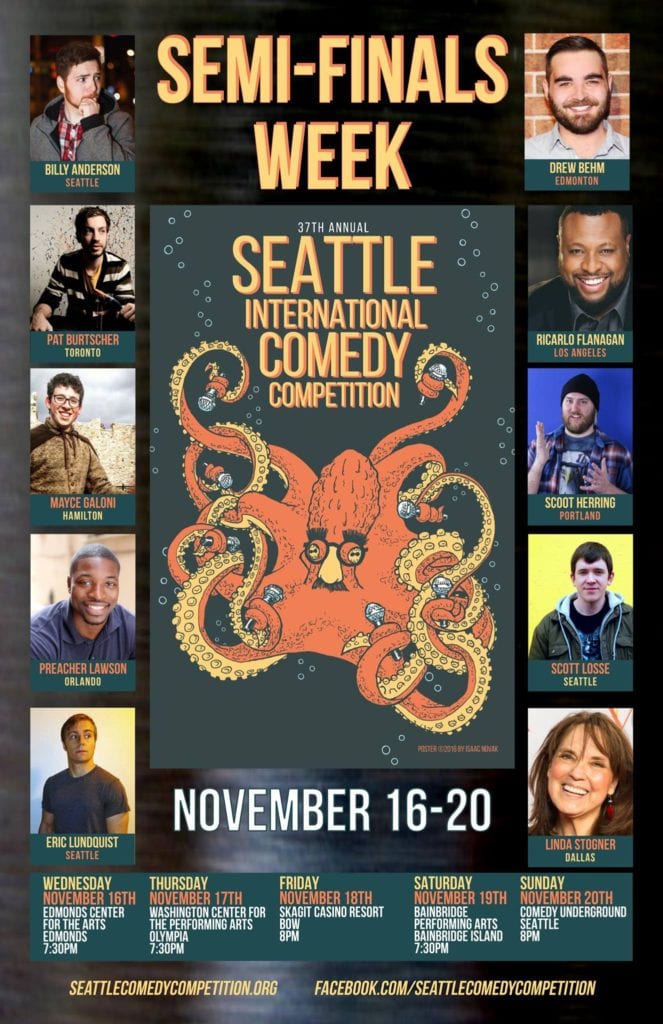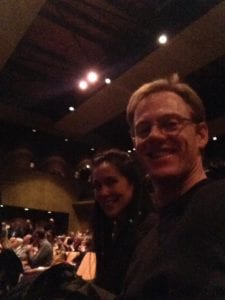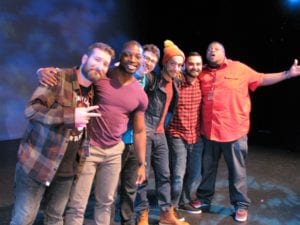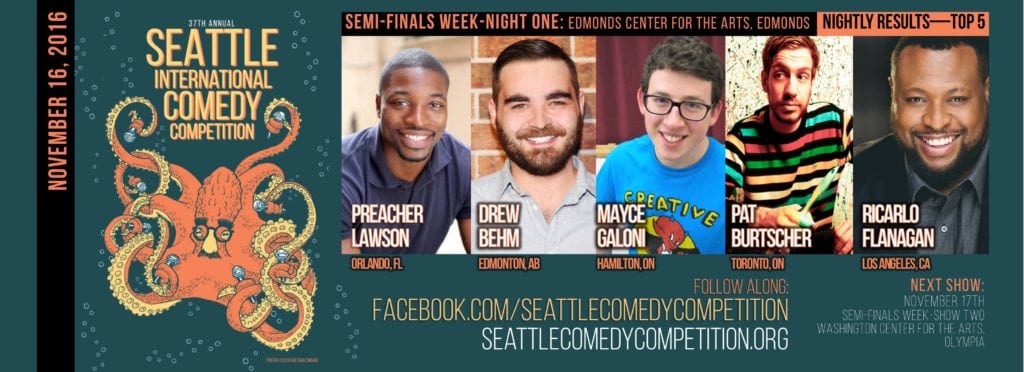
Last night I attended the first night of the Semifinals of the 37th Annual Seattle International Comedy Competition, at the Edmonds Center For The Arts. The top 10 comedians out of the 33 in the preliminaries competed to advance to the Finals. From here, only five advance and the rest go home.
The competition is run like the TV show Last Comic Standing and is run over 26 days, 22 shows, and at 18 venues from Vancouver to Bellingham. The comedians come from the U.S., Canada, UK, Europe, Australia, and Africa, and go head-to-head over $15,000 in cash prizes, in addition to exposure to talent executives from CBS, NBC, plus movie studios, managers, agents, and producers.
I heard about this from my friend Gary’s mom, Suzanne, a gourmet chef and caterer, of all sources. Of course, I had seen the ads but never bothered to buy tickets.
 Spending a Wednesday night on the town after getting up at 4:30 AM, sounded like a crazy decision, and then I realized how old that makes me sound! Ouch (well, I didn’t even sleep well that night either). I am sure glad I went!
Spending a Wednesday night on the town after getting up at 4:30 AM, sounded like a crazy decision, and then I realized how old that makes me sound! Ouch (well, I didn’t even sleep well that night either). I am sure glad I went!
We went to dinner with our friends and had a lovely time (I seem to have friends with exceptional hospitality, which is why I try to refrain from making them the butt of any of my jokes). Suzanne made us a dinner fit for kings and even sent us off to the comedy show with bags of gourmet desserts and chocolates to eat at intermission (friends moms are the best, amaright?!)
I had to read my program and study the website for awhile to understand what the heck is going on. The skinny is that we were at the first of five rounds of semi-finals. The first two weeks were to whittle it down from 33 comedians (half in the first week, and then the other half in the second week), resulting in 5 from each going to the semi-finals. So this was week three, and it is five days of shows to determine which of the 10 are going to finals. They all perform for five nights in a row and get ranked each night.
The Edmonds venue is beautiful and took me on a trip down memory lane since I grew up there. It seemed far more crowded and expensive than I remember, and the theater didn’t exist (in its current form) when I lived there. It used to be a sleepy suburb of Seattle, but far enough away to be an “exotic” waterfront town. Now it’s full of Yuppie and Hippy retirees with a ton of cash. More power to them.
The crowd seemed to be much older than the ones you get at most comedy clubs in the city, which I think affected the comedians’ reception far more than they realized. There was a huge generation gap that became very apparent when a couple of the twenty-two-year-old’s got up and told jokes about sex and atheism. Interestingly, the opener, Mayce Galoni from Hamilton, who was one of the youngest ones in the semi-finals finished in the top three after closing his act with extremely offensive anti-religion pro-atheism material. Apparently, the judges ate it up and it received many uncomfortable shock laughs from the audience. Oh wait, nevermind, that was just from me. The audiences in Washington State tend to love the anti-religion stuff. Never mind. I guess everyone loved it except me.
After Galoni started it off with a very strong first half of irreverence and cutting edge material showing his witty charm in a very American Pie kind of way, the next comedian hit the stage with an odd affect that no one could quite wrap their minds around. Linda Stogner of Dallas had perhaps the most impressive credentials, having won and Emmy, and worked with heavy hitters like Joan Rivers and several more.
Linda has that “I’m an odd bird” approach, which is a very risky thing to do in my opinion. It tends to lend itself to acting and character development, which if not viewed as completely authentic by the audience, can render the comedian washed up on the rocks. Sadly, in my opinion, Linda came across as trying a little too hard, which made us feel like she was “joking” us. By that, I mean that her naive or crazy character looked more like an attempted caricature that she herself no longer believed in. Because of this, I wasn’t completely convinced that she was truly who she was representing, and it seriously diminished her laughter power.
I feel that Linda could have been one of the best ones there, but she did not finish in the top five. After thinking on it, I feel that a simple change could make a world of difference. It has been said by some that a comedian who smiles too much or laughs at his or her own jokes tends to not get as many laughs as if they did not. I know this to be true personally, and I think it has to do with the audience’s reaction to the body language and facial expression of the comedian not lining up with what they are saying. For example, if I said that I slept in a dumpster last night with a straight face, and it happened to be the punch line of a joke I made about a night on the town, you would laugh far more than if I was smiling and giggling when I said it, as if I was anticipating my own punchline. Assuming you found the joke funny, to begin with, you would laugh more if you felt that it was true (or I at least gave you enough believability that you could suspend disbelief).
In this way, I think Linda could do much better. She has a great smile, but it takes away from some of her believability. She almost plays the role of an air head, but then underneath it all, I can tell she is quite intelligent. If we knew that Joey from the TV show Friends was really smart, we wouldn’t be able to laugh at all his stupid shenanigans, because we knew it would all be contrived.
Scoot Herring, from Portland, did a fine job of adding showmanship, with his singing and high level of physicality. At one point, he spent several of his precious minutes singing a rendition of Part of Your World from Disney’s The Little Mermaid… in a German accent. It got a laugh or two and the audience ultimately applauded the gimmick, but it went way too long and we kept waiting for a big finish or something that capped it and tied it together. In my opinion, he needed to do a full-on song parody if he was going to get my laugh. Showmanship can’t make weak material work, and without changing the lyrics, it was just a guy doing something kind of stupid for his friends in the bar. His final bit was an over-the-top phallic joke satirizing the sword in the stone. I didn’t bother laughing. Overall, he was good but needed to rethink his material.
Eric Lundquist from Seattle was the other twenty-two-year-old. He had a funny joke concerning age and not having seen the movie Cocoon, which I laughed out loud at. Overall, however, he came across as nervous and crude, with a few good lines here and there. I hate to beat people up in the comedy profession because I really do respect all of these people for doing what they do. After all, every one of them has gone further than I have as a comedian, so I say this with respect. My aim is to be helpful in evaluation and to give myself warnings and reminders. I think Lundquist would do well at frat houses at the UW, but in front of old fogies like me, it was just too crass.
Ricarlo Flanagan from Los Angeles was completely underrated and robbed by the end of the night. He had what I would consider a nearly perfect set (the only other with a perfect set was Preacher Lawson of Orlando who came away with first place). Ricarlo had truly funny material and great delivery. He was one of the few that also developed momentum and got on a roll. He was rarely offensive, and I only remember him swearing maybe one time (more on my view of this in a moment).
In fact, the one time he said something vulgar, it was in reference to larger people (like him), in particular, women in baths and it being like soup (I’ll spare the details). My wife suggested he change the punchline to something like “Big girl Bisque.” Ricarlo, if you are reading this, maybe consider a change like this and get a witty laugh, instead of the vulgar one, and your act will then be pretty much squeaky clean and can be performed in any venue. There’s a lot more money in corporate comedy than in the clubs and dive bars man!
I was taught to look at comedy objectively. As subjective as comedy is, you can measure audience response, in terms of the number of laughs in any given minute, or in the total time of positive laughter response in each sixty seconds. I was not able to videotape the performance so I can’t prove this, but just sitting there with this concept in mind, I can say almost assuredly that Flanagan had the most consistent laughs. Only Preacher Lawson had bigger and more sustained laughs, but Ricarlo Flanagan was definitely deserved of being in the top three, rather than in fifth place, where they put him.
Scott Losse of Seattle had some good jokes, but it was not consistent enough for me, and he never seemed to get on a roll. He too was full of blue humor and what seemed to me to be unnecessary amounts of vulgarity.
Since I keep mentioning that, let me explain my take on clean vs. dirty, blue vs. corporate, or cursing versus creative language.
I have said this before, but I really think the best comedians don’t need to go blue (dirty or vulgar, including but not limited to cursing and sexual subject matter). I think most bad language simply creates shock laughter, which is never quite as loud or strong or sustained as a good hearty belly laugh when someone says something truly witty or ingenious. Of course, from time to time, there is a great comedian who uses foul language to punctuate something that is already quite funny, but most comedians never get that good, and simply mimic the foul language itself, thinking that it is the key to the funny. Not so. Even a great like Richard Pryor, who paved the way for modern comedians, was a foul mouth, but the vast majority of wannabes that copied that part of his style never made it anywhere, proving that it wasn’t the vulgarity that made him great.
On a practical note, a clean comedian can work anywhere, and make a lot more money in the corporate market, than a blue comedian, who can pretty much only work in comedy clubs and has to wait for a big break on HBO. Good luck making a living if all you do is blue comedy.
Another thing that annoyed the heck out of me was the constant references to legal weed. I think the Canadians in the competition were obsessed with it, which actually did not do that well in front of the audience as they might have expected. Sure, people laugh the first twelve times, but after the thirteenth joke about weed, most of us were yawning. After all, how many times a day are you thinking about weed? You either are smoking it or you aren’t and that’s pretty much it. Most of the people I know are far more concerned with picking up kids from school on time, our friend’s crazy responses on Facebook to the elections, or when the next episode of Westworld is coming out. I frankly don’t want to hear about how high some broke comedian decided to get. Yawn!
Speaking of being high, I think the comedians must have all been drawing off the same doobie because at least half of them all mention “tea-bagging” at one point or another. Either that or everyone had just done a very odd pre-show pump-up ritual.
Billy Anderson from Seattle seemed like a guy who could do a lot of other forms of comedy, like sketch and improv (he was involved in Sketchfest in Seattle) but did not have enough consistently good material to build momentum. He had some very clever ideas, but it was spotty at best. Drew Behm from Edmonton was good and tended to work the stage like a nervous panther. He finished second, but I would have made him fourth.
Pat Burtscher was a huge surprise. He had to follow the number one finisher and had a completely opposite style. He reminded me of the kind of off-beat guys like Mike Birbiglia or even a Steven Wright. Unlike Stogner, he stayed very true to his character and was quite believable. He had probably the most interesting and intellectual humor of the night and had some of the best elements of surprise.
Finally, the top finisher of the night was Preacher Lawson of Orlando. He is extremely fast paced, high energy, and looks like he works out with very heavy waits twice a day. I would wager that his chief influence is Eddy Murphy. If that’s true, then good for him, because Eddy Murphy was one of the best there ever was and changed the entertainment industry by not “fighting” the race battle, but actually transcending it. I swear that Lawson even said a phrase or two that sounded identical to Murphy. Maybe it’s all in my head, but it wouldn’t matter anyway since he had a perfect set. Even his little asides and riffs with the audience were on point and got hilarious levels of laughter.
Now, his performance just adds more evidence to my case that clean comedians eventually go further and finish on top. Lawson was squeaky clean, and even when he dealt with subjects like race and religion, he managed to do it in a tasteful and witty way, that got a laugh without offending. In my mind, that is infinitely harder to do than simply picking on a group and hammering them. He did it with class and style and still managed to get the absurdities of life displayed in all their glory. The only downside of his performance was that it was so fast and so loud that the sound system didn’t always pick up on his words and created a bit of fuzz.

The actual order, according to the judges was:
- Preacher Lawson, Orlando, Fl
- Drew Behm, Edmonton, AB
- Mayce Galoni, Hamilton, ON
- Pat Burtscher, Toronto, ON
- Ricarlo Flanagan, Los Angeles, CA

Jesse’s Picks:
- Preacher Lawson
- Ricarldo Flanagan
- Pat Burtscher
- Drew Behm
- Mayce Galoni
As I won’t make it to the rest of the semi-finals, here is a prediction for the future!
Preacher Lawson takes the entire competition and only gets better. Mayce Galoni finishes second, because judges from the Seattle community will love his wit and “edgy” style with controversial topics as a young person, and Drew Behm will finish a distant third because the judges will think he has potential (no offense Drew, I actually think you are better than that).
If it were me, however, I would simply gauge audience response from something like Comedy Evaluator Pro or at least weigh it more heavily toward audience response, rather than any other factor. Sometimes judges will vote differently than the audience, which I disagree with wholeheartedly. They can have their favorites, but in the end, the comedian must please the audience, not one industry “pro”.